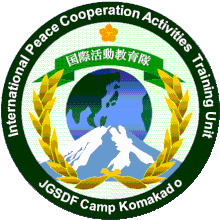International Peace Cooperation Activities Training Unit
| International Peace Cooperation Activities Training and Education Unit | |
|---|---|
 | |
| Active | March 28, 2007 - Present |
| Country | |
| Branch | |
| Type | Military Training unit |
| Role | Military Direct Action & Peacekeeping education unit |
| Size | 80 soldiers |
| Part of | |
| Garrison/HQ | Camp Komakado, Shizuoka[1] |
| Nickname(s) | IPCATU |
| Commanders | |
| Current commander | Mizuho Akiba[2] |
| Notable commanders | Colonel Masakazu Karube |
The International Peace Cooperation Activities Training Unit (国際活動教育隊, kokusai katsudō kyōiku tai) is the Japanese Ground Self-Defense Forces's training unit to prepare JGSDF soldiers by training them in scenarios that would require the mobilization of JGSDF forces in other countries. It is based in the JGSDF's Camp Komakado in Shizuoka Prefecture.
The IPCATU aims to have 240 soldiers graduate from the unit's training program annually.[3]
Colonel Karube says training with the IPCATU is an "important point is to verify whether the training now being conducted can really be useful in theaters of activity overseas and to develop unified know-how for personnel education."[4]
History[]
A provisional unit had been established on March 28, 2006, which was then followed by its expansion on August 1, 2006. The IPCATU's headquarters had been constructed on April 2006 before it was inaugurated on February 23, 2007. A special ceremony was established on September 19, 2008 to inaugurate the beginning of the unit's first official training program.[3]
The unit had been established in conjunction with the Central Readiness Force to the need of educating JGSDF forces to properly conduct operations in foreign soil. Its first commander was Colonel Masakazu Karube, who was unit commander from March 28, 2007 to March 25, 2009.
Training[]
Training under the IPCATU lasts for one month with graduates expecting to serve overseas in potential peacekeeping operations.[3] All participants are required then to attend a review session after each training session is complete.[4]
The IPCATU also provides supports for the Ministry of Foreign Affairs in peacebuilding development since 2008 for civilian peacebuiliding operations.[5]
Formation[]
The IPCATU has the following structure:[6]
Commander
- Headquarters - Command Sergeant Major
- Education Division
- Evaluation Division
- Research Division
- Education and Training Support Division
References[]
- ^ Jump up to: a b Central Readiness Force. "Organization". Central Readiness Force. Archived from the original on 2013-01-24. Retrieved 2009-09-01.
- ^ "Senior Specialist Course/Coursework Report: "Japan's Initiatives, Safety Management, etc."". Hiroshima Peacebuilders Center and Japanese Ministry of Foreign Affairs. Archived from the original on 2011-07-22. Retrieved 2010-03-13.
- ^ Jump up to: a b c "Central Readiness Force Unit Launches Training". Japan Defense Focus, Japanese Ministry of Defense. Archived from the original on 2012-03-27. Retrieved 2009-09-01.
- ^ Jump up to: a b "Special Feature: The GSDF Central Readiness Force - This Year's Aim is "Personal Training"". Japanese Ministry of Defense. November 2009. Archived from the original on 2012-03-27. Retrieved 2010-01-27.
- ^ "International Peace Cooperation Activities Training Unit".
- ^ "防衛省・自衛隊:防衛省ウェブサイトのHttpsへの切り替えのお知らせ". Archived from the original on 2017-03-23.
External links[]
- Official Site (in Japanese)
- Units and formations of the Japan Ground Self-Defense Force
- Military education and training in Japan
- United Nations peacekeeping
- Military units and formations established in 2007